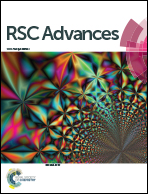Duckweed systems for eutrophic water purification through converting wastewater nutrients to high-starch biomass: comparative evaluation of three different genera (Spirodela polyrhiza, Lemna minor and Landoltia punctata) in monoculture or polyculture
Abstract
The polyculture of different duckweed species is likely to integrate their advantages in removing pollutants and starch accumulation. Here, pilot-scale comparisons of three duckweed species (Spirodela polyrhiza K1, Lemna minor K2 and Landoltia punctata K3) in monoculture and polyculture were investigated. Results showed that the TN (total nitrogen) and TP (total phosphorus) in wastewater decreased from 6.0 and 0.56 mg L−1 to below 0.5 and 0.1 mg L−1, respectively. Namely, the water quality improved to Grade II under the Chinese standard. The highest TN and TP removal efficiencies were found to be 99.1% and 90.8% in the polyculture. Besides, the starch content of S. polyrhiza K1, L. minor K2, L. punctata K3 and the polyculture reached 24.8%, 32.3%, 39.3% and 36.3%, respectively. Accordingly, their average starch accumulation rates were 1.65, 2.15, 3.11 and 2.72 g m−2 d−1, respectively. Our results suggested that L. punctata K3 was a promising energy feedstock due to it having the highest starch production. The advantages of different duckweed species were investigated. In the polyculture, the pollutants were efficiently removed from wastewater, with a high starch accumulation. This study supplies a new insight into the application of duckweed in eutrophic water advanced treatment coupled with starch production.



 Please wait while we load your content...
Please wait while we load your content...